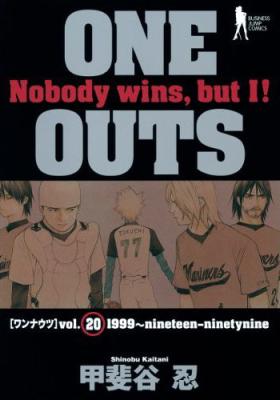One Outs is not a manga that concerns itself with the rules / techniques of baseball or a particular player's rise from being the disadvantaged underdog to a famous prodigy. This is more of a story about gambling and psychological play with the baseball diamond as its stage.
Certain readers complain about Toua Tokuchi's "unnatural brilliance." While I don't deny that his unparalleled genius is somewhat lacking in realism, it's rather enjoyable to come across a protagonist who's full of confidence and is not floundering in a sea of conflicting emotions or unnecessary worries; a man who knows exactly what he wants and has the mental capabilities to achieve those goals. Anyone who appreciates calm, ruthless, intelligent characters will doubtless enjoy following Tokuchi's tactical manoeuvres throughout the story. The question is never: "Will Tokuchi win?" but rather: How will Tokuchi (and the Lycaons) win?" (And more often than not, your guesses will be completely wrong!)
"Lack of character development" is the other primary complaint of the critics. But in my opinion, it's not necessary for a protagonist to have a tragic past, a complicated family background, or a dead lover in order to be realistic and relateable. These are adult men and professional baseball players. For them, the time of doubt, emotional turmoil and romantic entanglements is long gone. If that's what you're looking for, I'd recommend trying something like Major or H2 instead.
That being said, character development of a type entirely different from the norm is actually present, as becomes especially apparent in the latter half of the series. The evolution of the Lycaons players' willpower, confidence, tactical prowess, and team spirit (which, unlike in typical sports series, has nothing to do with friendship and more to do with pride and professionalism) is carefully laid out over the 20 volumes, and is a pretty interesting thing to watch out for.
The anime adaptation's very good -- actually even more exciting than the manga since the animation is able to convey the high-speed actions on the playing field far more effectively than static pictures (regardless of how skilfully drawn they may be) can. Either way, it's necessary to watch the anime before reading volume 10 of the manga, in order to bridge the gap in the scanlations.
Overall, a very interesting story. Even those who don't normally fancy sports themes might like to attempt this, as the psychological aspect is more fascinating and prominent than the actual game.





